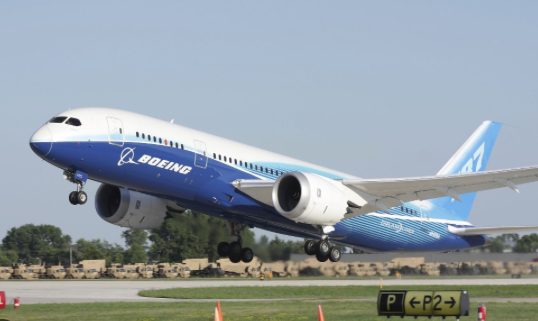A Boeing engineer-turned-whistleblower who contends that the aerospace giant’s 787 Dreamliner is unsafe to fly due to assembly flaws doubled down on his claims Tuesday, saying that the plane could fall apart and “drop to the ground” midflight unless the alleged safety problems are addressed.
Boeing disputed the claims on Tuesday, saying the plane is safe and the company is “fully confident in the 787 Dreamliner.”
Boeing quality engineer Sam Salehpour spoke to “NBC Nightly News” in his first on-camera interview since raising his allegations publicly last week. He said the company has yet to properly address tiny nonconforming gaps found in multiple planes after two sections of their fuselages were joined together during assembly. Salehpour said such “safety issues” could lead to catastrophic outcomes.
When asked if he would put his own family on a 787 right now, Salehpour didn’t hesitate. “Right now, I would not,” he said.
Salehpour is expected to testify before a U.S. Senate subcommittee Wednesday.
The allegations have emerged as Boeing continues to reel from the fallout of a midflight blowout of a door panel from a recently built 737 Max 9 during a crowded Alaska Airlines flight on Jan. 5. That incident has led to intense scrutiny of the company’s manufacturing processes and prompted Boeing CEO Dave Calhoun to announce he will step down as the company’s top official.
In a statement, Boeing said, “These claims about the structural integrity of the 787 are inaccurate. The issues raised have been subject to rigorous engineering examination under FAA oversight.”
At a media tour of its 787 Dreamliner manufacturing plant in South Carolina held Monday, two top Boeing engineers defended the structural integrity of the 787, saying the wide-body jet was stress-tested for 165,000 cycles, beyond the expected lifespan of the plane, and never failed. The company said it had inspected 689 of the more than 1,100 787s in service worldwide and found no evidence of fatigue.
Jeff Guzzetti, a former Federal Aviation Administration safety investigator, told NBC News, “Even if these cracks would form, which there’s no evidence of, the airplane is so resistant, and so structurally robust, according to Boeing, that they’re not going to break apart.”
Despite such assurances, Salehpour remained steadfast in his claims to NBC News on Tuesday, saying that production of the 787 should be halted while the alleged problems are addressed in the fleet now in service. He noted that the gaps could make the 787 susceptible to “premature fatigue failure,” particularly as the planes get older.
Salehpour’s allegations first became public last week, in a report by The New York Times and later in other media. Salehpour flagged the issue to the FAA in January, and the agency has said it is investigating his claims. Salehpour, who has worked for Boeing for 15 years, said that after he raised concerns internally, Boeing transferred him to work on the 777 line in 2022.
“Retaliation is strictly prohibited at Boeing,” the company has said.
Salehpour told NBC News he felt compelled to go public. “When I see questionable actions that could cause safety problems, I have committed I’m going to come forward regardless of what the cost is,” he said.
Salehpour’s attorney, Lisa Banks, separately told NBC News on Tuesday that she has heard from at least half a dozen “additional would-be whistleblowers at Boeing who have reported the same kinds of issues that Sam has raised with Boeing.”
“I’m 100% confident in Sam’s allegations because they’re based on Boeing’s own data and Sam’s decades of experience as a quality engineer,” Banks said.


